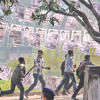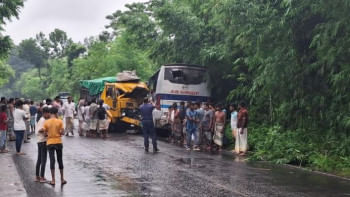51pc seats saw vote rigging, TIB says based on survey in 50 constituencies

The 12th parliamentary election was a one-sided one that was staged to appear competitive, said Transparency International Bangladesh (TIB) yesterday.
"It is an ominous sign regarding the future of democracy and democratic elections in Bangladesh," said TIB Executive Director Dr Iftekharuzzaman at a press conference to share the findings of the global anti-corruption watchdog's study titled "The 12th Parliament Election Process Tracking".
The preconditions for ensuring a free, participatory, neutral and even field of competition were not fulfilled in the 12th parliamentary election, he said.
"The agenda to ensure continuous stay in power through one-sided election has been successfully achieved, the legality of which may not be challenged, or may not sustain if challenged. But in terms of political integrity, democratic and moral values this success will always remain debatable."
The election has further entrenched the ruling party's absolute control over the country's political landscape and governance, with the scope of unaccountable exercise of absolute power expanding even further.
"Election promises to establish good governance and rein in corruption in the country are likely to become more unrealistic and only documents," Iftekharuzzaman added.
The study, which was conducted in 50 out of 300 constituencies in eight divisions between June 2023 and January this year, found multiple irregularities in all the constituencies on election day.
As much as 51 percent of the constituencies surveyed saw incidents of vote-rigging, open-sealing and booth-capturing.
All the Awami League candidates have violated the electoral code of conduct at least once.
Besides, 97.3 percent of the independent (AL) candidates, 87.5 percent of other independent candidates and 84.9 percent of the Jatiyo Party candidates have violated the code.
As much as 98 percent of the candidates spent more than the maximum expenditure limit of Tk 25 lakh in the election in the seats surveyed.
In those seats, candidates spent an average of Tk 1.56 crore in the election, which is more than six times the expenditure limit, TIB found.
The highest expenditure of Tk 38.77 crore was by an AL candidate, the study said, without disclosing the name of the individual.
According to the study, the ruling party used force in various forms to achieve the 50 percent voter turnout target.
Instances were reported where threats were made to suspend government services and allowances from the social security programmes for marginalised and underprivileged individuals, including ordinary voters, if they failed to attend meetings of the ruling party and go to the polling centres and vote for specific symbols. it found.
Additionally, there were cases of government officials openly displaying loyalty to the ruling party and participating in partisan activities, such as supporting and campaigning for the ruling party candidates.
In 85.7 percent of seats, the administration and law enforcement agencies were inactive in various disciplinary violations.
Security was not ensured equally for all candidates, the study found.
In 77.6 percent of the seats, there were barriers to information flow or obstacles in communication. Polling agents of opponents were not allowed to enter the respective centres in 75 percent of the seats.
Journalists and election observers faced obstacles in entering centres in 61 percent of the seats.
TIB found serious irregularities in 55 percent of the constituencies studied where voters were forced to cast their votes to a specific symbol.
There was fraud in about 43 percent of the seats' votes. In 38 percent of the seats, voters were bribed with either cash or transport or food.
"The Election Commission has acted as one of the catalysts to implement the election agenda in the name of constitutional obligations and legal boundaries. Other state institutions, especially law enforcement and administration, have also been used to support the same agenda," Iftekharuzzaman said.
The election was the costliest too: the original budget was Tk 1,445 crore, but the expenditure ultimately increased to Tk 2,276 crore, which is triple compared to the 11th election.
The budgets for the 2014 and 2018 elections were Tk 300 crore and Tk 700 crore respectively.

 For all latest news, follow The Daily Star's Google News channel.
For all latest news, follow The Daily Star's Google News channel. 








Comments